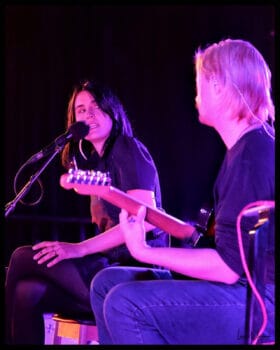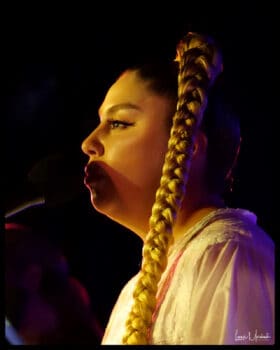Te Kaahu – Tuning Fork: June 24, 2022 (Concert Review)
Te Kaahu begin their show with a ceremonial homage to the inaugural Matariki public holiday in New Zealand. The winter solstice, where the Pleiades constellation reappears in the sky after a month of hibernation, and which is celebrated by Māori as the beginning of the solar cycle. Life, the present moment. Death, the ancestors stretching back in time. Rebirth, the energy of the young and revitalisation.
Em-Haley Walker is also Indie-Pop artist Theia, and in this iteration as a powerful Wahine from her ancestral home of Waikato, she will perform a Soul Graft. An attachment of the spiritual energy and mana of this land to all of us present tonight.
The concert launch of her acclaimed new album, Te Kaahu O Rangi, released in CD format. Yes, go and buy it.
Dressed in white, her trademark long braided hair is now an umbilical cord conjuring up her female ancestors on to the stage. That is the opening waiata, the title track.
The Waikato taniwha rau and… the hundred spirit guardians, at every bend.
 Hina
Hina
Hina is Amy Boroevich from Auckland and she has a familiar sweet Indie-Pop sound. A multi-instrumentalist with a long history in violin and chamber music whilst at school. Started to write and fashion her current style as a bedroom artist.
Mostly a solo musician with guitar and loops, tonight she has Harry on electric guitar and Caitlin on cajon.
Made This Way is pleasant enough until a Derek and the Dominoes-styled Southern Blues guitar break lifts it out of the ordinary.
Reverie and Go So Well, both off her sole EP, and she has a nice folk voice. She uses subtlety and nuance to give it a pop swing.
Someone To Miss is spare and quiet and has the naïve folk sound of a Jonathan Richman.
Letter to my Love starts with the same riff as the Beatles Blackbird before heading into Emo.
Concludes with To the Bone where she is solo and looping an electric guitar, and it’s a nice surprise. She has that spare skeletal sound of Springsteen’s Nebraska, and there is feel of a free spirit haunting a highway. The Desert Road at twilight.
 Mohi
Mohi
Mohi is Mohi Wati Te Rau Allen from the heart of West Auckland in Henderson. With a four-piece band of electric guitar, bass, drums and keyboards behind him, he sings in a soft swinging Soul Jazz style which is both warm and invites dancing.
Which the front of the house does with a little prompting.
His songs are predominantly in te reo, and first to go, E Kii, he gets to swing in the manner of a Mel Torme. A seemingly effortless, easy style.
Adds some Funk on Rehurehu.
Takiri switches to a Folk Rock guitar intro to lead into a soft soul vocal that is reminiscent of whanau house-party gatherings. Then Brother Joe on keyboards takes it out with some Caldonian Soul stylings, of the legendary Van Morrison band type, from the Seventies. A highlight.
So is Taste of Home, written about his roots in Ohaeawai in the Far North. Take me back to the place / Greener than before. A Reggae off-beat accent, but actually closer to the Rocksteady style of Jamaican Soul before Bob Marley broke internationally. Mohi stands out here, with a vocal that sounds like classic period Smokey Robinson.
Both support acts give a context to frame what is to come with the headline act.
 Te Kaahu
Te Kaahu
With E Hine E are introduced a quartet of Diocesan School girls to accompany Te Kaahu. The sound is of a choir from that Home on High.
He Hiimene is a Gospel hymn with an ancient Folk sound and the combined voices sound celestial.
Waikato starts with a Fifties twangy guitar from Jol Mulholland. Then the Folk styled voices come in with a dramatic vertical lift-off in harmony. Pure and crystalline.
Pai Maarire is about peaceful resistance to the loss of land and the spiritual movement that grew around that, from Te Kaahu’s homeland of Waikato. The sound is a Girl Group lament. The Shirelles, and probably the point of creation, the Chantel’s and their ground-breaking Maybe.
Rangirara and the two backing singers are Samara and Coco. This song directly addresses her grandmother. A beautiful lap steel from Levi Gemmell, a large part of what places this show in the Fifties. The sound of halls and ballrooms in the provincial heartland and Hawaiian cadences.
E Taku Huia Kaimanawa. Spectral Lady Gaga style singing. E hoki mai ra aue sounds fantastic as its repeated.
This is brave and ground-breaking music. It is an act of creation which taps into ancient roots. The music is heavily immersed in the Fifties, but through some alchemy which is hard to fathom and must come from the Heart spirit, it has an air of otherworldliness and feminine magic. Which I can only compare to the incredible Bulgarian women choirs of the Mystere de Voix Bulgares.
Young Maori musicians are forging ahead in recent times to create styles of music in te reo, which could become as distinctive as Jamaican music. Ska to Rocksteady to Reggae, Dub and beyond.
The last Auckland Folk Festival which actually went ahead featured te reo. Troy Kingi debuted his folk album. Te Aro were there, who do sophisticated Pop Jazz te Reo, that appeals to primary schools. Alien Weaponry from Waipu are putting out thrilling Metal Haka music.
Teeks and Marlon Williams would be more in the school of music that Te Kaahu is projecting from. As Theia she has also delved into Rap in recent times.
Kiwi Weka was written by a great-aunt in the Forties, and was a standard which I had never heard, until tonight. The story of the American servicemen in New Zealand during World War Two. The title is referring to women’s role back then. Flightless, and so stay home to mind the nest and bring up children. Has the rhythm of Poi E with a Hawaiian swing, and is a banger as the singer states.
Te Kaiwhakaora O Te Au finishes the night with everyone singing, accompanied by a sole guitar. Touches on the heavenly sound of classic Doo-Wop, let’s say Gloria by the Cadillacs.
I know there were many friends and whanau in the audience tonight, but the warmth of spirit enveloped everyone present. No surprise that many found themselves emotional.
I was born in Pukekohe and grew up there. I am Indian and my family come from market gardening backgrounds. The separatism and racial exclusion that blighted Maori lives so extremely from the Twenties to the Seventies in that county, also included Indians and Asians to a lesser degree. In some ways the healing is yet to begin. Maori and European who experienced this do not want to talk about it today.
This is the first Matariki public holiday, and the importance of this emotionally for the performers was all-encompassing. What was presented on stage magnified the power that comes from the album. Music performance can be an act of magic and transformation with great artists. With it comes responsibility as there is also the possibility of psychic damage.
Te Kaahu were able to graft a healing spirit on to the souls of everyone present. And a lot more.
Rev Orange Peel
Click on any image to view a photo gallery by Leonie Moreland:
Hina:
Mohi:
Te Kaahu:
- Adam Hattaway & The HauntersJuly 25, 2024Wine Cellar (13th Floor Concert Review) - July 26, 2024
- New Music Friday: 13th Floor New Album Picks: July 26, 2024 - July 26, 2024
- Holly Arrowsmith – Blue Dreams(Leather Jacket Records) - July 25, 2024
